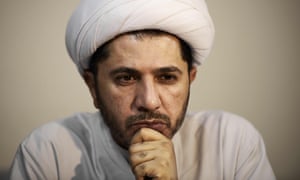Bahrain election condemned

Upcoming parliamentary elections in Bahrain have been deprived of any legitimacy by a ban on opposition parties, legislators in the US, UK, Ireland and the European parliament have declared in four separate letters calling on the country to end the repression.
Bahrain, a former British colony ruled by the Sunni al-Khalifa royal family, is due to hold elections on 24 November for the Council of Representatives of Bahrain's national assembly, one of the Gulf's few democratic institutions. Bahrain's assembly consists of an upper house appointed directly by King Hamad bin Isa al-Khalifa called the Shura or consultative council, and an elected council of representatives, the main lawmaking body, each with 40 seats.
Nearly 366,000 citizens have been declared eligible to vote. Separately, members of the royal family hold 12 of the 26 posts in the cabinet. The other 14 posts are held by political appointees that are not members of the royal family.
But the validity of these elections has been thrown into question by a ban imposed on opposition parties and a life sentence this month handed down to the opposition leader Sheikh Ali Salman, the secretary general of leading opposition political party, Al-Wefaq. He has been found guilty of allegedly spying for Qatar.
International election monitors have been banned, as they were at the time of the last elections in 2014. Bahrain is a long-standing American ally and host of the US Fifth Fleet, and is also given substantial financial aid by the UK to boost its internal human rights work. The elections come at a difficult time for the Gulf state as its public finances have been hit hard by a slump in oil prices. Tensions with the Shia majority opposition have been persistent and lie behind the bans on the opposition.
A cross-party group of British MPs, including the Conservative MP Peter Bottomley, the Green party MP Caroline Lucas, and the Liberal Democrat MP Tom Brake said in a letter to the Foreign Office that Bahrain "effectively bans major opposition figures from holding political office".
They added: "Between the membership of the dissolved opposition groups and the countless Bahrainis incarcerated on charges that criminalize free expression and assembly, the ban affects tens of thousands of people. "Free and fair elections can only take place if citizens are able to express their views. Yet the only independent newspaper, Al-Wasat, was forcibly closed in 2017, while at least 15 journalists are currently imprisoned and Bahrain's most prominent human rights defender, Nabeel Rajab, has joined his partner in prison, for comments deemed critical of the Bahraini state.
"Bahrain may be a key strategic ally to the UK but human rights and democratic values are fundamental pillars of our society and foreign policy", the letter concludes. The UK foreign secretary, Jeremy Hunt, is promoting human rights and press freedom in the opening months of his job, so the Bahrain elections represent a test case. In the US, pressure is being applied by the congressmen, James McGovern and Randy Hultgren, co-chairs of the bipartisan Tom Lantos human rights commission in the US House of Representatives.
The two issued a strongly worded letter last week claiming the government "has dissolved two major opposition political societies, barred all members of the societies from running for office on an individual basis, and imprisoned a number of key figures, as well as writers and civil society leaders. In addition, Bahrain's electoral infrastructure inherently disadvantages the political opposition. There is no independent electoral commission and, to date, there has been no commitment by the government to permit either domestic or international observers. "It will be difficult under these conditions for the international community to recognize the upcoming elections as legitimate," the statement said.
Bahrain may find itself under more pointed American pressure due to the former human rights official, Tom Malinowski, being elected to Congress this week. He is expected to be a strong voice for democracy in the Gulf. Malinowski was declared persona non grata after he met Bahrain opposition leaders in 2014. In Ireland a cross-party group of Irish MP involved in foreign affairs also called for the release of all political prisoners, and allowing international bodies to enter Bahrain in order to monitor the elections.
As many as 40 MEPs, in a letter to the king due to be published next week, said Bahrain is missing the opportunity of the elections "to ease tensions and allow space for open dialogue to take place. Instead, we have seen the enactment of increasingly repressive measures. Under these conditions, Bahrain's elections cannot be recognised by the international community as free, fair, or legitimate".
Sayed Ahmed Alwadaei, director of the Bahrain Institute for Rights and Democracy, said: "Clearly, legislatures from the world's leading democratic states believe that the upcoming election in Bahrain lacks legitimacy. You simply cannot crush torture and imprison your entire opposition, call for a pseudo-election and then demand the respect of the international community." The Bahraini embassy in London has been contacted for comment.
